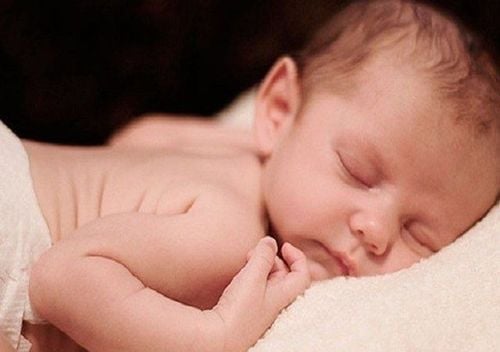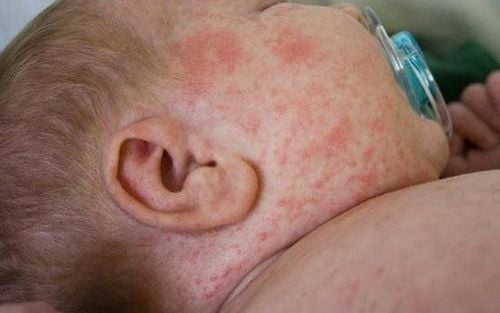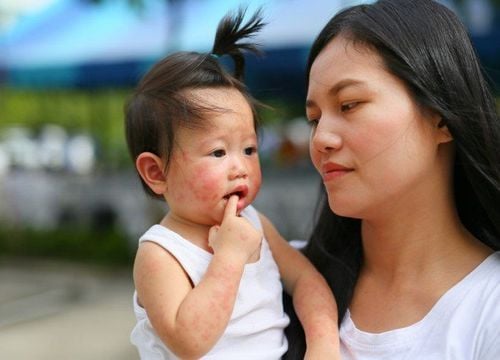1. Excessive sweating in newborns - A common phenomenon
The condition of sweating in newborns is very common, especially the phenomenon of night sweats. Night sweats in newborns refer to the body sweating without relation to weather factors, occurring only when the child sleeps (usually at night). The rate of night sweats in children is higher than in adults.
Sweat consists of water, salt, and waste products, with water accounting for over 90%. Therefore, frequent sweating can cause the child to lose a significant amount of water and salt, leading to fatigue and exhaustion.
There are two types of night sweats:
- Physiological night sweats: In children, metabolic processes are stronger than in adults, so sweating is a way for the child's body to release heat. In this case, night sweats do not adversely affect the child's health;
- Pathological night sweats: This condition often occurs in children with rickets. Signs include excessive sweating unrelated to weather or environment, especially sweating a lot while breastfeeding or after sleeping. Additionally, children may show poor appetite, enlarged bone ends, a protruding chest, etc. Areas commonly affected by night sweats include the back, forehead, armpits, hands, and feet.
Trắc nghiệm: các chỉ số cần chú ý về sự phát triển thể chất của trẻ
Chiều cao, cân nặng của bé ở từng giai đoạn nên là bao nhiêu là bình thường, bao nhiêu là bất thường? Cùng ThS.BS Ma Văn Thấm điểm lại xem bạn đã nắm được các chỉ số phát triển thể chất của bé chưa nhé!The following content is prepared under supervision of Thạc sĩ, Bác sĩ y khoa, Ma Văn Thấm , Nhi , Phòng khám Đa khoa Vinmec Dương Đông(Phú Quốc)
2. Causes of newborn sweating on hands and feet
Sweating on the hands and feet in newborns is often due to an underdeveloped nervous system that regulates sweat production. If the child feeds well and gains weight normally, parents need not worry, as the condition will resolve as the child grows. However, some cases may persist into adulthood, requiring medical intervention such as surgery to cut the nerve ganglia regulating sweat secretion.
Other causes of sweating on hands and feet in newborns include:
- Vitamin D deficiency: In infants and especially newborns, strong bone development requires vitamin D. A deficiency in vitamin D can lead to excessive sweating. Premature infants, underweight babies, children with rickets, infections, or digestive disorders are more prone to vitamin D deficiency and night sweats;
- Sleep Apnea: Premature infants may experience sleep apnea. This phenomenon can last about 20 seconds and is characterized by pale skin, wheezing, and excessive sweating;
- Hyperhidrosis: This syndrome may occur in young children, showing excessive sweating in hands and feet even in cool, ventilated spaces;
- Congenital heart disease: Sweating not only during sleep but also during activities could stem from cardiovascular conditions in the child;
- Sudden Infant Death Syndrome (SIDS): If the baby sleeps in a hot, stuffy room, they may sweat excessively, become lethargic, and stop breathing—symptoms of SIDS - sudden death syndrome;
In addition, other causes include calcium or zinc deficiencies, autonomic nervous system disorders, or sympathetic overactivity.

3. Solutions to reduce sweating on hands and feet in newborns
When your baby's hands and feet sweat, parents can use a soft towel to wipe the baby's hands and feet and gently massage the baby's hands and feet for a while to make the baby feel warmer. To address the condition, parents can apply the following measures:
- Vitamin D supplementation: There are many ways to help supplement vitamin D for infants. Parents can expose their children to morning sunlight (6–9 a.m. in summer, 9–10 a.m. in winter). Only the child’s skin should be exposed to light; avoid direct sunlight exposure to the child’s eyes;
- To keep your baby cool: Create a spacious, airy living environment and ensure the baby’s sleeping area is not stuffy. At the same time, parents need to keep their baby's body clean and provide adequate hydration;
- Pay attention to nutrition: Breastfeeding mothers or babies who are eating solid foods should eat vegetables, tubers, and fruits that are cooling, such as oranges, squash, pennywort, bok choy,... and should limit hot, greasy foods to avoid sweating. At the same time, parents should give their children more fresh fruit or fruit juice to prevent vitamin deficiency in children.
If these measures are ineffective or if sweating on hands and feet persists alongside serious symptoms like fever, delayed teething, late walking, or delayed closing of the fontanelle, parents should take the child to a doctor for timely examination and treatment.
With years of experience in diagnosing and treating pediatric conditions, the Pediatric Department at Vinmec International Hospital has become a major healthcare center capable of screening and treating numerous pediatric specialties. Parents can take their child to Vinmec for examination and professional advice from doctors and experts if excessive sweating persists.
Please dial HOTLINE for more information or register for an appointment HERE. Download MyVinmec app to make appointments faster and to manage your bookings easily.














